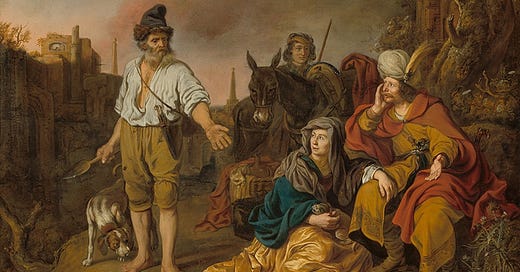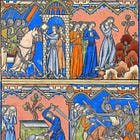Judges Chapter 19 Bible Study
Potentially the most disturbing Bible passage ever
This is part nineteen of my Judges study. Read the previous parts here and watch for part twenty coming on July 16. Just a warning: this chapter is what I (and many others) consider to be the darkest and most graphic story in the Bible, so be aware that it is about some very messed-up stuff happening, including sexual violence and dismemberment.
This chapter begins by reiterating that “there was no king in Israel,” something we have heard many times by now. It foreshadows that something very sinful is about to happen in the following verses, as there was no central authority, and people did whatever they wanted. We are then introduced to the most important characters of this story, a Levite from the hill country of Ephraim, and his concubine, a woman from Bethlehem in Judea, neither of whom are named.
It is interesting that the unnamed woman was a concubine rather than a wife, given that the Levite is nowhere stated to have a wife. Regardless of whether or not the Levite had a wife, this concubine would have had lower status than a wife, and the fact that she is described as being “acquired” by the Levite implies that she had little choice in the matter.1 Here, readings differ, with some saying that the concubine was unfaithful and others saying she was angry with the Levite.2 Whatever the case, she then went back to live with her father, where she stayed for four months until the Levite went there with his servant and a pair of donkeys to convince her to come back to him.
After three days of the Levite staying at the house of his father-in-law, he and his concubine got ready to leave, but the concubine’s father persuaded the couple to eat something first to keep their strength up. Once they had done so, he insisted that they also stay the night, which they did. On the fifth day, the man also told his son-in-law to stay and eat something, so it was late afternoon by the time the Levite and his concubine finally left. Although he wanted them to stay another night, the Levite refused the offer and set off. At the end of verse nine, when the concubine’s father said, “go home,” it is literally translated as “go to your tent,” which he probably said in an attempt to persuade the Levite to stay for another night in his house.3 So, the Levite saddled up his donkeys.
I wanted to give a shout-out to this funny quote in Mary J. Evans’s commentary, which says,
“the donkeys were saddled, so it does appear that they are for riding and not pack animals. Does it indicate that he was not a man without resources and thus explain why the father was so pleased to see him? Or was it just that the writers of Judges had a particular interest in donkeys? One-tenth of all the verses in the Old Testament referring to donkeys are found in the book of Judges!”4

When they reached Jerusalem, which was then called Jebus, the Levite’s servant suggested they stay there overnight, but the Levite said they should not, as it was a Jebusite city with no Israelites.
By the time the sun was setting, the couple, with their servant and donkeys, had reached the Benjamite city of Gibeah. So, they went in and sat in the city square, waiting for someone to come and take them into their home for the night. It might seem odd to us that they would wait around for someone to invite them for the night (I would never spend the night in some random stranger’s house!), but hospitality was a big deal in the ancient Near East and extending hospitality to strangers was seen as a matter of covenant loyalty.5 Finally, in the evening, an old man came back from working in the fields and asked the couple where they came from and where they were headed. The Levite explained that they were on their way from Bethlehem to the hill country of Ephraim, and no one had taken them into their home, but they did have enough food for themselves and their animals.
He also said that they were “going to the house of the Lord,” in the Hebrew text, though the Greek version reads “going to my house” instead.6 If the former is the correct reading, the Levite probably just made up that excuse on the spot to sound pious, as there is no indication in the chapter that it was actually his intention.7
After hearing this, the old man invited the couple to stay at his house, saying he would provide for them, so they went and ate, drank, and washed their feet while he fed the donkeys. Suddenly, a bunch of wicked men from the city surrounded the house and, in a scene reminiscent of the men of Sodom in Genesis 19, began banging on the door, demanding that the old man give the Levite over to them so they could use him for sex. Their purpose in this would have been primarily motivated by a desire to demonstrate their superiority over the Levite through humiliation.8
The old man refused, saying that the Levite was a guest in his house and told the men they should not commit such immoral acts. But this was not just some nice hospitable old man, because he instead offered the men his virgin daughter and the Levite’s concubine to do whatever they wanted with, though they refused to listen to him. Not only does the old man offering his virgin daughter to the gang of men mirror Lot doing the very same thing to both his virgin daughters (Genesis 19:8), but it is the second time in Judges that a father sacrifices his virgin daughter, the other being Jephthah in Judges 11.9
Then, the Levite took his concubine out and gave her over to the men, who raped and abused her all night long. At daybreak, the gang of men let the concubine go, and she managed to make it back to the old man’s house, where she collapsed at the door. When the Levite opened the door to leave, he saw his concubine lying there, her hands on the threshold. Completely apathetic about what had happened to her, he demanded that she get up. As she gave no response, her took her body and placed it upon one of his donkeys to head home. This is not the first time in Judges that a woman rides a donkey; the other time is Achsah in Judges 1:14, who, unlike this woman, is treated well. Where at the beginning of the book of Judges, women are active participants in the story, the latter chapters are replete with violence against unnamed and voiceless women, showing how bad things in Israel have gotten.
At his house, the Levite took a knife and cut her body up into twelve pieces, sending them to various parts of Israel. This act is made even more atrocious by the fact that whether or not she was dead at the time of dismemberment is left ambiguous by the Hebrew version; it could have been the Levite himself who actually killed her.10 Everyone who saw it said that nothing like this had happened since they left Egypt in the exodus, and the news of this horrific act spread far.
This is obviously a very disturbing story. I still remember the first time I read it with my family when I was probably a pre-teen… and I found it truly horrifying. Judges 19 shows just how depraved Israel had gotten during this time. It is a tragic story in which the men act horribly and the women are dehumanized, seen only as objects for men to do whatever they want with. The Bible is very clear that the things that went down in this story are deeply wrong, yet given our sinful nature, humans continue to do evil.
BIBLIOGRAPHY
Block, Daniel I. “Judges.” In Joshua, Judges & Ruth, edited by John H. Walton, 198-451. Zondervan Illustrated Bible Backgrounds Commentary Series. Grand Rapids, MI: Zondervan, 2009.
Boda, Mark J. “Judges.” In Judges, Ruth, edited by Tremper Longman III and David E. Garland, 30-347. The Expositor’s Bible Commentary Series. Grand Rapids, MI: Zondervan, 2012.
Evans, Mary J. Judges and Ruth. Tyndale Old Testament Commentaries Series. Downers Grove, IL: InterVarsity Press, 2017.
McCann, J. Clinton. Judges. Interpretation: A Bible Commentary for Preaching and Teaching Series. Louisville, KY: John Knox Press, 2011.
Way, Kenneth C. Judges and Ruth. Teach the Text Commentary Series. Grand Rapids, MI: Baker Books, 2016.
Webb, Barry G. The Book of Judges. The New International Commentary on the Old Testament Series. Grand Rapids, MI: William B. Eerdmans Publishing Company, 2012.
Younger Jr., K. Lawson. Judges and Ruth. The NIV Application Commentary Series. Grand Rapids, MI: Zondervan, 2002.
Webb, The Book of Judges, 454.
Younger, Judges and Ruth, 341.
Webb, The Book of Judges, 459.
Evans, Judges and Ruth, 179.
McCann, Judges, 136.
Way, Judges and Ruth, 229.
Boda, “Judges,” 310.
McCann, Judges, 138.
Obviously, there is a difference here, as Jephthah’s daughter was literally sacrificed as a burnt offering, and the old man’s daughter here was spared, but her father himself suggested sacrificing her over to the men, so they both had horrible fathers.
Webb, The Book of Judges, 470.







Rachel- kudos to you for addressing this most horrific story. I do remember as I was reading through the OT to my son - this was the only chapter I skipped. I just couldn't. The depravity of the man sacrificing her is the complete opposite of what husbands ought to do. They are always to love, protect, and sacrifice. It always shocked and angered me that he blames others instead of taking any responsibility. I am grateful for my husband and the love he shows.